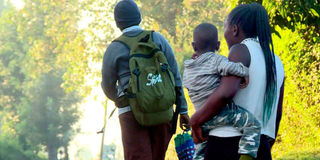Agony of children who cannot pass stool the normal way

Joseph Njaramba and Rose Atieno with her baby. The two children were born with a condition that makes it hard for them to excrete the normal way.
What you need to know:
- For many people, having a meal and going to the toilet hours later is a straight-forward process.
- Not so for these two minors who have had to undergo surgery for an opening to be created on their bodies for them to pass stool.
When you think about it, the digestion process appears seamless. You eat, drink, and after a while, elimination of undigested food takes place. The process is so efficient that we often forget its intricacy.

Rose Atieno during the interview in Dandora, Nairobi. Her child has undergone six surgeries, but none has been successful.
Now, imagine this. You eat, drink but cannot excrete waste the normal way and have to take medications to help you do that.
Yet, this is a lived experience of some individuals and in this case, children.
In Nairobi’s Dandora Phase Four Estate, Rose Atieno ushers us into her house; with her three-year-old son strapped on her back.
As we enter her living room, we observe that the right section of her cupboard is packed with different types of medication and on the other end, a chair is piled up with folded cut pieces of clothes.

Stoma bags that Rose Atieno’s baby uses to collect stool.
A few minutes into our stay, the baby starts to cry and one of Rose’s other children swings into action.
“When he cries, it means the wound is burning him and he is getting irritated,” says the mother of three.
She gently removes his clothes, leaving his chest bare. On his stomach, she had tied a diaper fastening it with some pieces of clothes. We spot a small, pink, round and button-like structure on the skin and there’s a small bag, like a pouch attached to it meant to collect his waste.
“He had all the hallmarks of a healthy baby when he was born; with the only concern being that he had not passed stool during our three-days stay at the hospital. The doctors said there was nothing amiss about it and anyway, he did it two days later after discharge,” she explains.
Dr Sarah Okebe, a paediatric surgery resident at Kenyatta National Hospital (KNH), offers that this structure is called a stoma. “This is a tissue opening of the intestines made in the interior abdomen, which is used as a temporary measure to empty one’s stool,” says Dr Okebe.
The mouth, anus and the nose are natural stomata. However, any organ, including the stomach, can be manipulated to form an opening. There are different types of stoma with colostomy, which involves bringing part of the colon to the wall of the abdomen to allow one to excrete safely into a collection bag.
“I do menial jobs to earn a living and I remember when it all started, I had stepped out to look for a job. On the first day, he had diarrhoea, and it happened on the subsequent day. That was concerning,” narrates Rose.
She visited a neighbouring health facility and the doctors prescribed anti-diarrhoea medications. It helped stop the diarrhoea, but something else also happened –the baby couldn’t pass stool.
“The stomach started to swell. He was struggling to feed but the swelling was continuing. If he did, then an explosive diarrhoea followed so we stopped feeding him solid foods because he was becoming dehydrated,” she offers.
Her search for treatment started and it was as expensive as it was a confusing journey for the family. “I was told all manner of things that saw me try anything that could help my baby. From seeking divine prayers to other alternatives, we did not find a solution,” narrates Rose.
“At the hospital, an operation was done but a complication happened almost immediately after discharge. We went back again and another surgery was done.”
Dr Okebe says Hirschsprung's disease is a major cause of this ailment.

Grace Nyaguthie during the interview at her home in Ikigaini village, Nyeri County. Her family has spent more than Sh2 million on her son’s treatment.
This is a condition where the large intestines fail to pass stool due to missing nerves cells or dead nerve cells. “When the child comes to you, you have to quickly divert the stool; and that is why we put the stoma to release the waste and pressure. Then we have to analyse where the nerves have reached. So we remove the part where the nerves are either dead or have not reached and fix the part that has the nerves to the anus - and that is what we call a pull through surgery. So we expect the part that has the nerves to function.”
However, the doctor explains that the surgery can fail and the blockage can reoccur due to injured blood vessels in the area or an infection.
Rose's child has undergone six surgeries, but none has been successful. She does menial jobs and relies on donations for stoma bags. When there’s none, she uses pieces of clothes. “He doesn’t feed on anything that is acidic or foods that contain a lot of gas. No porridge or roasted groundnuts. He also does not eat vegetables. It is a daily struggle to provide for his meals and drugs, which have become his lifeline,” she says.
Because of her son’s condition, she hardly is away from him, which has not only crippled them financially but also means that it is difficult to accord her three-year-old proper care like she would have wished.
“You see me tying clothes on his stomach and that is because I cannot afford to buy a stoma bag, which costs between Sh900 and Sh1,200. And once he has used the bag, I have to throw it away. I use these pieces of clothes as I can wash them,” she offers.
Kilometres away from Nairobi, the chirping of birds melodiously welcome us to Ikighaini village in Nyeri County. It is at the break of dawn and Grace Nyaguthie is preparing her 11-year-old son for school.
From a distance, one would be forgiven to assume that the cold weather is the reason Grace has laid many layers of clothes for her son, Joseph Njaramba, to wear.
A closer look and we can see Grace gently cleaning the stoma area on the stomach’s surface. As she gently applies petroleum jelly around it, Joseph flinches due to some slight discomfort, but he says he is now used to it. This is the routine before and after school. Grace ensures she cleans the stoma and gently applies petroleum jelly to reduce chances of inflammation or irritation.
“I am now 11 years old and I have had this condition since I was young. I flinched because of the discomfort but it’s not painful. My mother has been taking care of me. In school, some children make fun of me and don’t want to play with me, but some understand my condition,” he says.
Even as Joseph tries to have a normal life, he is not allowed to do intense activities or take part in intensive games at school. “Joseph was born with this condition. I remember the doctors injecting a liquid into his rectum on the fourth day and this enabled him to pass stool,” she offers.
By the third week, Grace had noted that her son had not passed stool again and he had a swollen stomach. “I went back to the hospital and we got a prescription. The drugs helped him to pass stool.”
Yet, the condition persisted. “One of the earliest memories of that journey is at KNH, where the doctors told us that part of his intestinal nerves were dead. They recommended a surgery to help open up his anus and it was successful; but the problem recurred,” she says.
At the time, the health system had been crippled by the doctors’ strike. This meant waiting and by the time they were able to seek medical treatment at a public facility, the area that had previously been operated on was now blocked.
“Joseph had to undergo another surgery, which was not successful as they could not determine the reason for the second blockage. I was then sent for another test, which revealed that his intestines had folded. Doctors recommended dilatation, which involved an insertion to expand the opening of the anus. “I couldn’t continue doing it after the first attempt. It was too painful to watch as he cried his eyes out,” says Grace.
This called for a return to the hospital, where he was admitted and scheduled for yet another surgery. “This time they were not quick to discharge us and as days went, he developed another complication causing another blockage; and the waste came out in the form of a vomit,” she narrates.
Another procedure. A renewed hope
This has become his life as he is now scheduled for yet another operation. “We are supposed to prepare for another surgery. This has crippled me financially and there are many times when a colostomy bag is a luxury,” she says, adding that the family has spent more than Sh2 million on his treatment.
“There are times I miss school due to my condition and it makes me feel bad. Also, there are some sports I cannot take part in because they are intensive in nature,” says Joseph.
Dr Okebe observes that Kenya currently does not have a national registry for those who are ailing from the disease. “We just have institutional data at the moment and at KNH, we see about three to four of such cases every month. But for cases of confirmed Hirshsprungs, that could be 10 children in a year,” she offers.
While the families of these children have gone to great lengths to ensure their children receive the proper medical treatment, their fate rests in the hands of the healthcare system; for necessary surgeries and provision of the colostomy bags.




